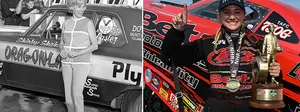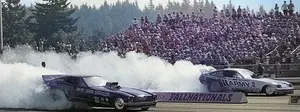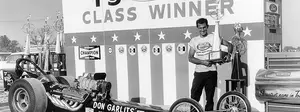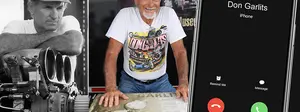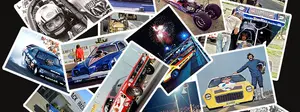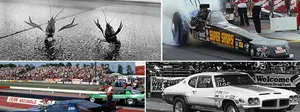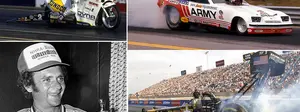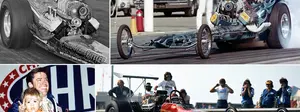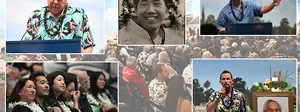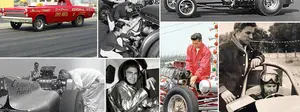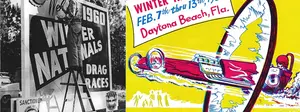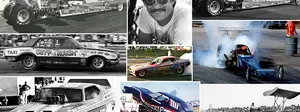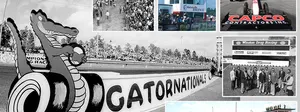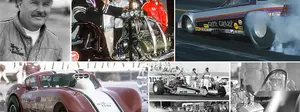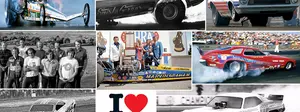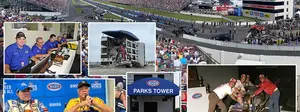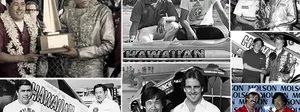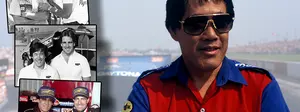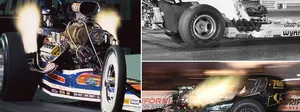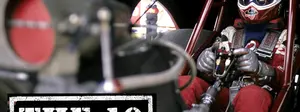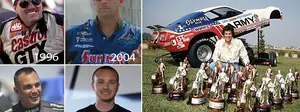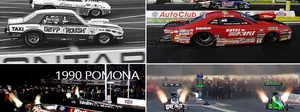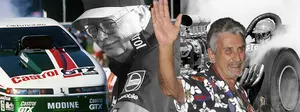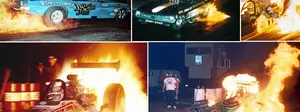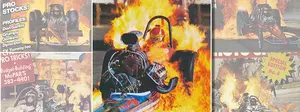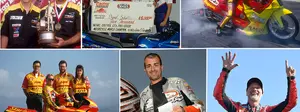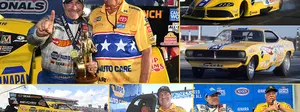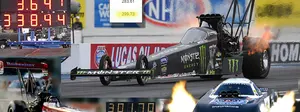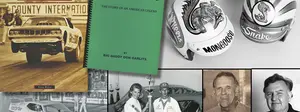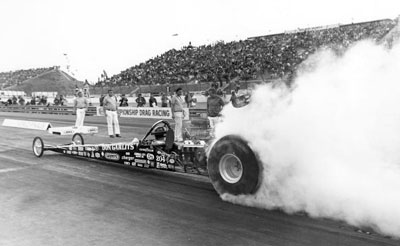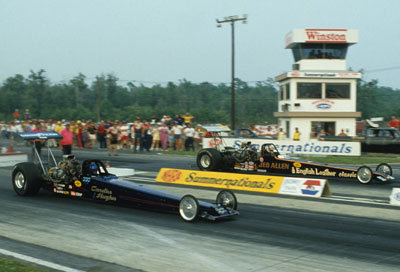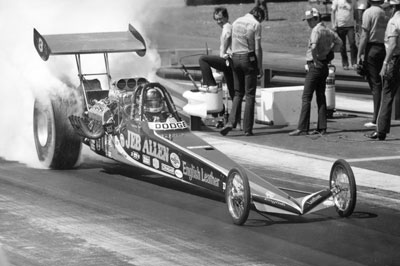2,470 days later ...
|
Seeing Mark Oswald in the news from Chicago as the capable fill-in driver for Mike Ashley probably stoked the memories of a lot of fans who remember Oswald’s 1984 Funny Car world championship in the Candies & Hughes Firebird, but for me, and with the New Jersey event just down the road, I’ll always remember Oswald as the guy who broke the longest-standing NHRA Professional national record, Don Garlits’ stunning 5.637-second blast from the 1975 NHRA Supernationals/World Finals in Ontario, Calif., a mark that stood for 2,470 days -- more than six years and nine months -- from Oct. 12, 1975, until July 17, 1982, when Oswald broke it during the NHRA Summernationals in E-town. (By way of comparison, it took just five years to drop the Top Fuel national record a full second, from Tom Raley’s September 1970 standard of 6.63, set in Atco, N.J., to Garlits’ 5.63 in 1975.)
Garlits’ 5.63, run Saturday of the Finals (Oct. 11) and backed up with a 5.65 to make it official Sunday (Oct. 12), was mind-boggling because it was more than a tenth and a half quicker than his own NHRA Top Fuel e.t. record of 5.784 seconds, set two years earlier at the same event. Whether it was because of the “top secret” Goodyear tires Garlits was alleged to be running, a new engine combination, a super-sticky application of VHT traction compound – all cited as factors by one source or another --- or the fact that bitter rival Gary Beck first claimed a new record the day before with a 5.69 blast, Garlits was ready.
“The air was right, the wind was right, the car was right, the engine was super strong, everything was nice,” Garlits wrote in his 1976 autobiography. “It was just a perfect time.
“I let it warm up real good and built some heat [into the engine]. I let the clutch out on that baby and it carried the wheels out there 400 feet and just pulled like a ripper. I shifted it, and the front end came up again, and I knew I was on my way. I went through the traps and by the time I got lifted I was 150 feet through the traps. I knew I must have some kind of record because it seemed like the fastest ride I’d ever taken.”
|
Oswald erased Garlits' name from the record books under similar conditions, on a simmering Saturday night at Raceway Park, prime for a record. “The track was hot and sticky with traction-packed rubber, while the air was still a bit warm but punctuated with an occasional cool breeze,” read National DRAGSTER’s report. “The moist atmospheric conditions provided the ideal kind of breathing material for nitro-burning race engines.”
The 1982 Englishtown event was a special one to be sure. Just before Oswald’s pass in Saturday night's qualifying session, Billy Meyer's 7-Eleven/Chief Auto Parts Trans Am Funny Car ran an unheard-of 5.82 at 254.95 mph, the quickest Funny Car run ever and the fastest speed regardless of class. The 5.82 held as a new national record, and Meyer later sped to a 250.69-mph clocking that backed up the new speed mark.
Like Garlits’ Wynn’s Charger, Oswald’s blue machine also had the wheels up -- almost too far up – and powered through to a 5.618-second blast that was backed up by a 5.65 recorded two days earlier.
“The 5.61 was a marginal pass,” Oswald said at the time. “The wheelstand was just on the edge of control, and I was a split second from shutting the car off.” The team added weight and made changes for eliminations to “calm it down” but still ran 5.65 in the semifinals and won the event, eventually finishing second to Shirley Muldowney in the championship battle.
So why did Garlits' record stand for so long?
In a 2005 interview with National DRAGSTER, Garlits revealed that the power for his 5.63 run came from a new set of high-compression pistons and a trick new camshaft. To keep the pistons under wraps, he had a friend in another city order just 10, and he said that the camshaft was only good for a few runs, making the whole combination rare and worth protecting. After the record run, he said he took the engine and “hid it under a tarp for the next seven or eight years; I hoped that no one would figure it out because when they did, drag racing would get very expensive."
He also admitted that he had no idea his 5.63 would remain the record for so long. “I figured that someone else might come up with the same combination and [the record] would be broken by the end of 1976,” he said. “I could have run it more if I had asked for stronger rods and fixed other weak links in the combination, but I decided to remain quiet because I knew it would raise the cost of racing for everybody.”
Nobody came even close to the 5.63 in 1976. Muldowney ran a season-best 5.77 in Ontario, and the best Garlits could muster was a 5.78, at Union Grove. In 1977, Garlits received a questionable 5.64 time slip at a match race at Green Valley, but the best legit time was a 5.75 (and a 5.77) by James Warren and the Ridge Route Terrors in Bakersfield en route to winning their third straight March Meet. Beck’s 5.76, again in Ontario, was the best number of 1978, followed by Garlits’ 5.77 from the Winternationals. Dave Settles shoed the Candies & Hughes dragster to the three quickest passes of the 1979 campaign, the best of which was a 5.77. NHRA Top Fuelers didn’t officially find the 5.6s again until Marvin Graham crushed out a great 5.68 in qualifying in Indy before the dams burst in 1981.
|
In the interest of fair reporting, Jeb Allen had actually run quicker than Garlits’ 5.63 more than a year before Oswald broke the record, recording a 5.62 March 12, 1981, during Thursday qualifying for that year’s Gatornationals, but was unable to back it up for a new record. An oil leak on his only other qualifying attempt didn’t help, and he was defeated in round one by Frank Bradley on a narrow 5.79 to 5.80 count. (Minor historical note: John Force set what I believe is his first national record at the event, upping the Funny Car speed mark from 245.90 to 246.57; the record lasted all of six minutes before Don Prudhomme reset the mark to 247.25 two pair later.)
By the end of the 1981 season, Allen’s 5.62 wasn’t even among the year’s eight quickest, having been supplanted by Beck’s sizzling 5.57 in the final round of the World Finals at Orange County and a pair of 5.57s posted by Muldowney and Jerry Ruth on Spokane, Wash.’s sometimes overly enthusiastic clocks.
And by the end of the 1982 season, Oswald’s 5.61 had become just a footnote in history as Beck powered his way into the 5.4-second zone in Indy that year with a dazzling 5.48 as well as making runs of 5.52, 5.54, and 5.55, and he was joined in the .50s in Indy by Connie Kalitta (5.56) and Muldowney, who also ran 5.56 and a pair of 5.57s.
A footnote, yes, but one still long remembered by plenty of us.


